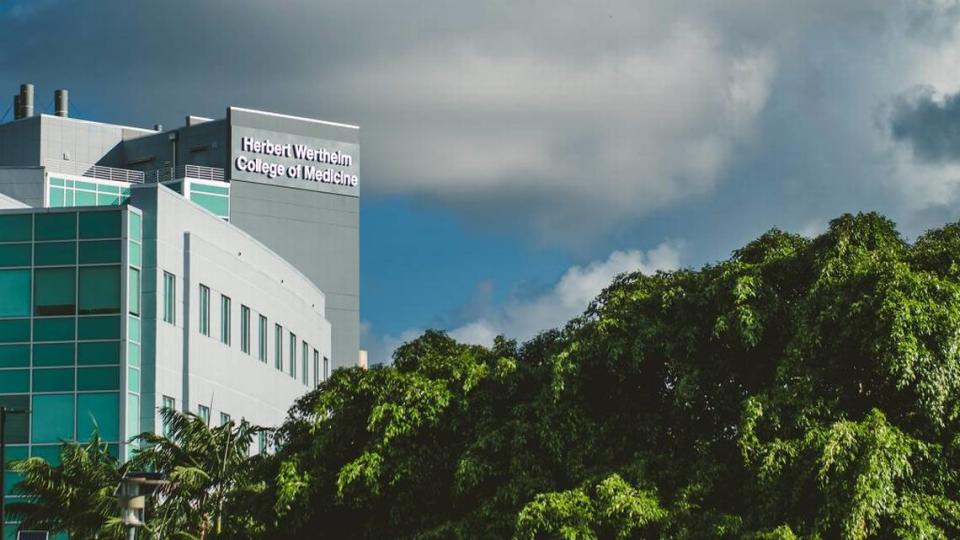FIU’s medical school just got a new dean — and he’s got big plans for students, patients
Florida International University’s medical school, founded in 2006, recently got its third official dean — a Cuban-born surgeon who grew up in Miami and graduated from the University of Florida. He joined FIU, the largest public university in South Florida, about a year ago.
Dr. Juan Cendan, 56, practiced general surgery for four years after finishing his medical degree in Gainesville in 1997. In 2001, he shifted his career toward higher education, teaching at UF for about nine years. In 2010, he transferred to the University of Central Florida in Orlando as a founding faculty of its medical school, where he stayed for about 11 years.
Cendan first arrived to FIU in March 2021 as a professor of surgery and the vice dean and executive associate dean for student affairs at the Herbert Wertheim College of Medicine. In September, he became interim dean of the medical school.
Last week, FIU announced he would stay in the role long-term.

Cendan succeeded Dr. Robert Sackstein, also a Cuban-born doctor who grew up in Miami. Sacktein left the Harvard Medical School to assume the top role at FIU in January 2019, but only held it for about three years before becoming FIU’s senior vice president for global medical affairs last September.
Under Sackstein, in March 2020, FIU lost five medical school administrators who left to launch another medical school in the Las Vegas area.
FIU President Kenneth Jessell called Cendan “the right leader for this moment” in the medical school’s history.
READ MORE: ‘The world has lost an icon’: Beloved FIU professor, dean dies. There from early days
“He has a unique combination of practice and academic leadership experience coupled with a clear and ambitious vision for our College of Medicine,” Jessell said in a statement.
The change in status, Cendan said, empowers him to explore bigger ideas for the medical school that he couldn’t before as a provisional head.
“I feel great. I’m energized,” he said. “Going from interim to permanent gives you that feeling that you have the vote of support, the vote of confidence of the leadership and the faculty.”
What’s next?
Cendan will now focus on expanding the “clinical footprint” of the medical school, which he said has been “modest” so far due to the “limited capabilities” of FIU’s “small” ambulatory care clinic based in its Modesto A. Maidique Campus in West Miami-Dade.
That, he said, will strengthen students’ direct relationships with patients, and their opportunities for training and research.
Cendan believes that will also foster the medical school’s culture of community help. While other schools prioritize research, FIU has focused on teaching its medical students about patients — what they eat, how they live, whether they can fill a prescription.
READ MORE: ADHD meds don’t lead to higher grades or more learning, FIU study finds
He brought in consultants to evaluate growth options. The medical school could develop by building new facilities, connecting with local partners in the city and region, or launching new programs inside the existing clinic — or a combination of the three and more.
Cendan said he doesn’t see FIU’s medical evolution clashing with the private Miller School of Medicine at the University of Miami, the predominant teaching institution in the Miami area since 1952 and the state’s oldest.
“FIU can start growing little by little to complement what’s already here. There’s already a tremendous amount of excellence in healthcare delivery and education, but there’s room. And if you look at America’s big, big cities, many have more than two medical schools,” he said. “It’s not an us and them. I think there’s capacity for all.”
Three things to know about Dr. Cendan
1. He’s been in constant awe of Miami’s growth
In 1968, Cendan’s family moved from Cuba to a town outside of Barcelona in Spain. In 1974, they relocated to Hialeah, as he started the fourth grade. He learned English at Hialeah Elementary and later graduated from Miami Springs High School.
His first memory of Miami was going from the airport to a cousin’s home, passing the Dolphin–Palmetto interchange, and thinking, “Oh my God, what a big city this is.”
Decades later, when he relocated to Miami as an adult, he found himself rethinking that.
“The shock is now simply driving down Wynwood or down Brickell and saying, ‘None of this was here. None of this was here,’” he said, chuckling and admiring the vast choices from restaurants to healthcare services now available in the area.
2. Didn’t have an early calling
Many doctors have a formative experience — like seeing a relative die of a serious illness — that triggered the desire to go into medicine. Not Cendan.
He didn’t consider the occupation until he studied biomedical engineering at Tulane University in New Orleans.
“I didn’t have one of those early callings. To me it was more of a discussion with friends and colleagues as an undergraduate student,” Cendan said.
3. He’s married with two sons
Cendan’s wife, Dr. Judith Seline Simms-Cendan, works as a professor of pediatric and adolescent gynecology at UM.
They have two adult sons — the oldest, a video game audio designer, lives in Vancouver, and the youngest, a high school music band director, lives in Orlando.

 Yahoo Sports
Yahoo Sports 